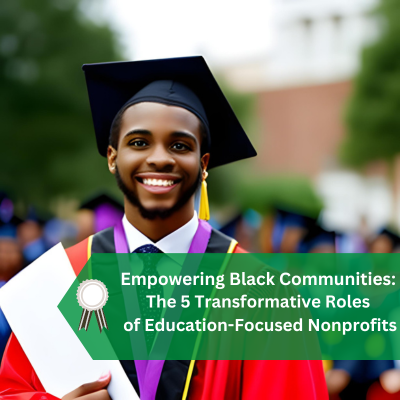Why is Education important for the Black community?
Education is a civil right! Education is the cornerstone of personal and societal growth, but not everyone has equal access to quality education. In this blog, we explore the profound impact of black organizations focused on education in the quest for educational equity and excellence. From addressing systemic bias to fostering mentorship programs, these organizations are catalyzing change in the education sector. By the end of this blog, you’ll have a comprehensive understanding of how black-led initiatives are shaping the future of education.
Table of Content
-
Advancing Educational Equity and Excellence
-
Shaping Schools, Students, and Teachers
-
Confronting Systematic Bias
-
The Importance of Mentoring Programs
-
Philanthropy’s Role in Elevating Black Voices
1. Advancing Educational Equity and Excellence
Black nonprofits are at the forefront of the battle for educational equity. They advocate for increased funding to underserved schools, promote culturally relevant curricula, and work tirelessly to ensure that students, regardless of their background, have access to necessary resources. These organizations understand that dismantling systemic barriers is crucial to achieving educational equity.
According to recent data, schools with predominantly black student populations receive 23 billion dollars less in funding compared to predominantly white schools in the United States.
2. Shaping Schools, Students, and Teachers
Education focused nonprofits play a pivotal role in shaping the learning and scholastic landscape. They collaborate with schools to develop effective teaching methods, provide professional development opportunities for educators, and offer vital resources to students. By partnering with educational institutions, these organizations are redefining the learning experience.
In addition, Black-led nonprofits in education are working to add representation in teaching to add black educators, which has a positive effect on black students, black parents, and the black community. They help schools tackle the problems of limited resources, achievement gaps, and opportunity gaps in schools. Here are recent examples of how black nonprofits are working towards this goal:
- The Center for Racial Justice in Education developed a Black History Month guide with several resources to increase Black representation in education.
- The White House Initiative on Advancing Educational Equity, Excellence, and Economic Opportunity for Black Americans works with individuals and organizations throughout the country to shape positive and affirming narratives of Black students and highlight and disseminate promising and proven practices.
Both black students and black parents can benefit from interacting with teachers who can relate to their experiences.
3. Confronting Systematic Bias
Black nonprofits are working to change the system at different levels and at the core to confront systematic bias in the education sector. Systematic bias has far-reaching consequences on black students’ educational opportunities. Black nonprofits are confronting this issue head-on by advocating for anti-discrimination policies, culturally responsive teaching practices, and inclusive school environments. They recognize that eliminating bias is essential to creating an equitable education system.
For example, racially segregated housing creates racial isolation, with disproportionate costs to Black Americans’ opportunities, networks, education, wealth, health, and legal treatment. These institutional and societal systems build-in individual bias and racialized interactions, resulting in systemic racism.
4. The Importance of Mentoring Programs
Mentoring programs are instrumental in ensuring black students’ educational success. These programs provide guidance, support, and a sense of belonging, helping students navigate the challenges they may face. Black nonprofits are increasingly recognizing the importance of mentorship as a tool for empowerment.
Mentorship programs are a great way for black nonprofits to empower both the mentees and the mentors, providing a great environment for empowerment on both sides. Here are some ways mentorship programs benefit the mentees and the mentors:
Benefits for Mentees:
- Mentoring programs provide students with guidance, support, and encouragement to help them achieve their goals.
- Mentoring programs for black students have been successful in improving academic achievement, increasing graduation rates, and reducing dropout rates.
- Mentoring programs help socialize mentees into the professions and the work environment.
Benefits for Mentors:
- Mentors have the opportunity to give back and help the next generation of leaders in their community.
- Mentors can develop their leadership and communication skills.
Black nonprofits are working to provide mentorship programs to black students and professionals, which can help close the achievement gap and promote diversity and inclusion in the workforce.
5. Philanthropy’s Role in Elevating Black Voices
The role of philanthropy in elevating and amplifying black voices in the education sector cannot be overstated. By supporting black-led nonprofits, individuals and corporations alike can make a lasting impact on educational equity. Philanthropic efforts are crucial in sustaining and expanding the reach of these nonprofits.
In 2020, philanthropic contributions to black-led education nonprofits saw a 30% increase, signaling a growing commitment to the cause.
We invite you to make a difference by supporting the Global Black Philanthropy Initiative (GBPI) at www.Global-BPI.org. In September, the focus is on Quality Education (UN’s SDG#4), you can choose to contribute to the missions of black nonprofits listed under the SDG#4 category on Support Black Charities’ online vetted directory. Your contribution and investment, no matter the size, will have a lasting impact on the future of education within the Global Black Community. Donate once, impact many, and join the movement towards a more equitable and educated world. Together, we can make it happen!
Conclusion
In summary, by addressing these critical topics, we gain a comprehensive understanding of how black-led initiatives are shaping the future of education in their communities in addition to shining a light on their indispensable role within the entire education sector. Their efforts are not only advancing educational equity and excellence but also challenging systematic bias and providing vital mentorship programs. Together, they are bringing quality education to communities worldwide.


